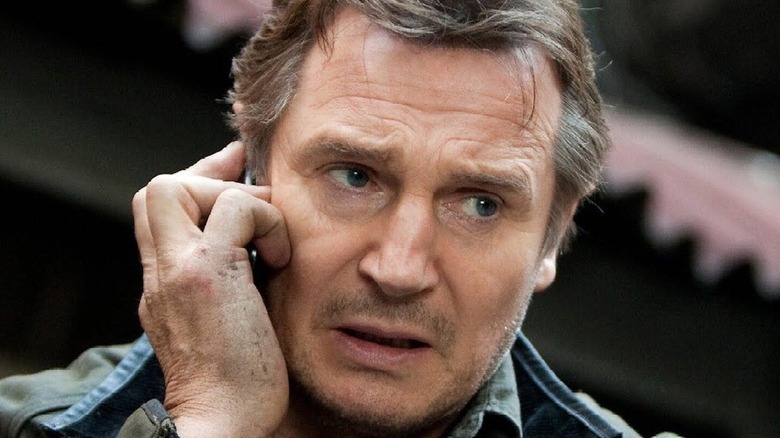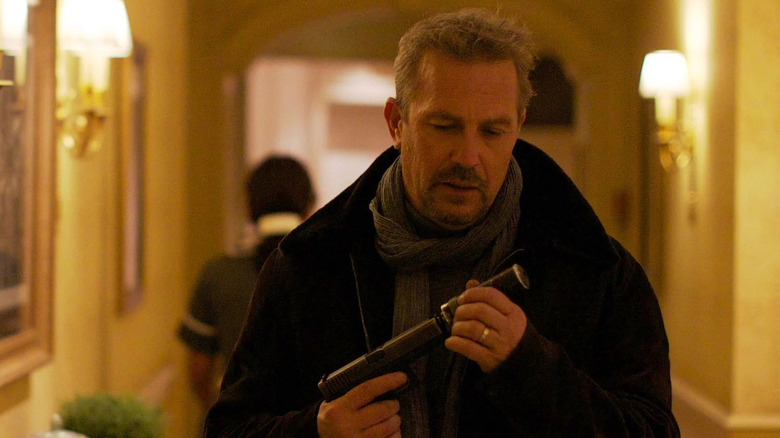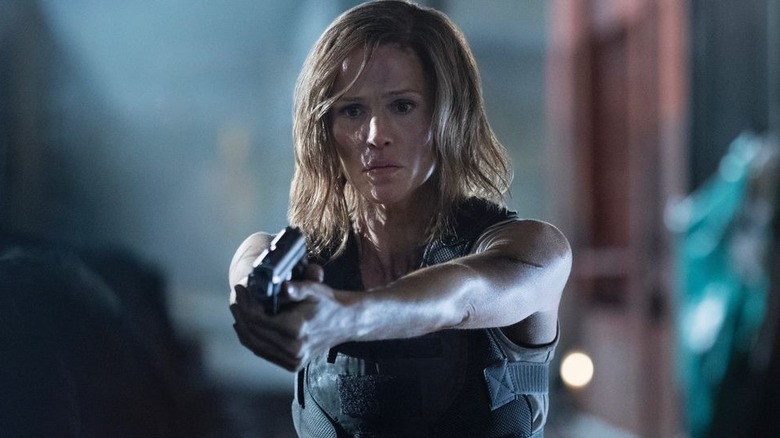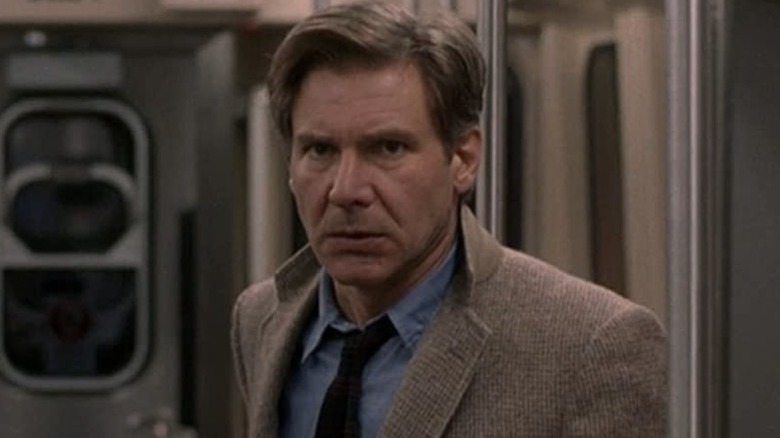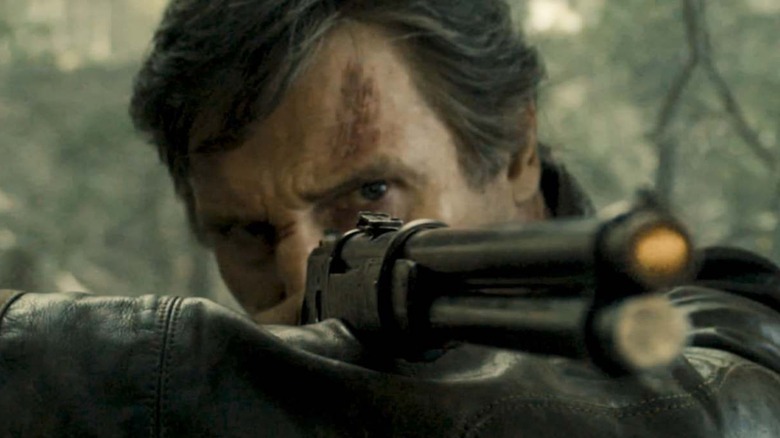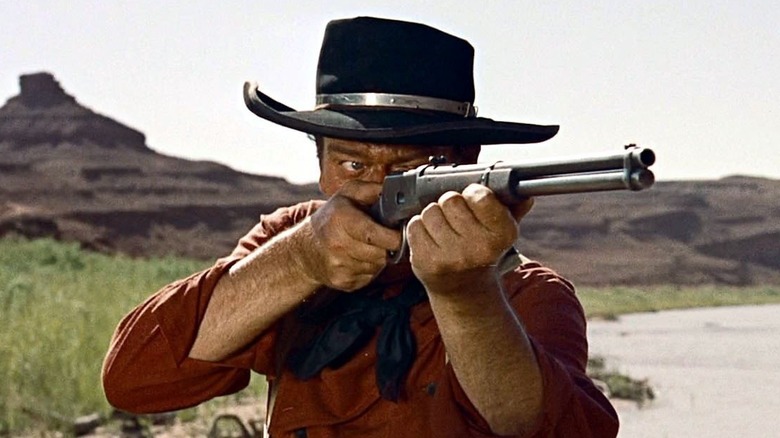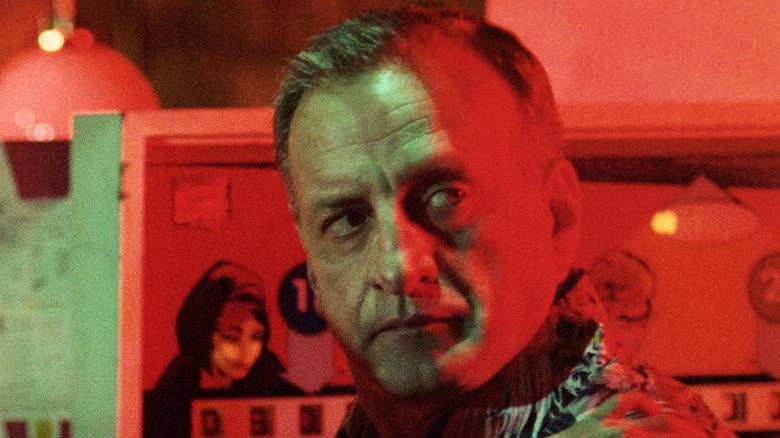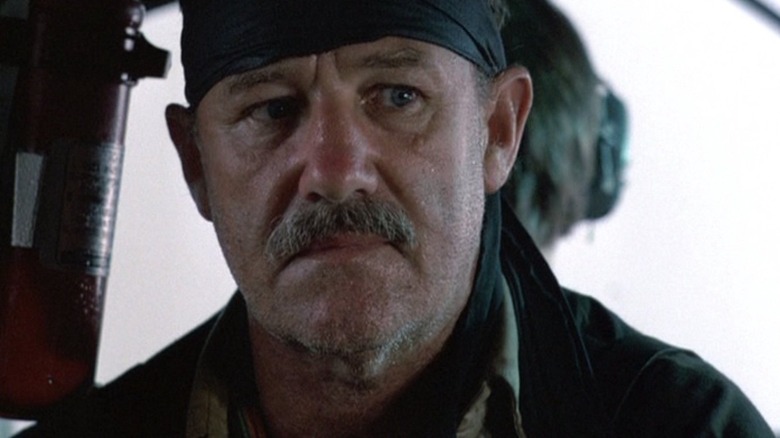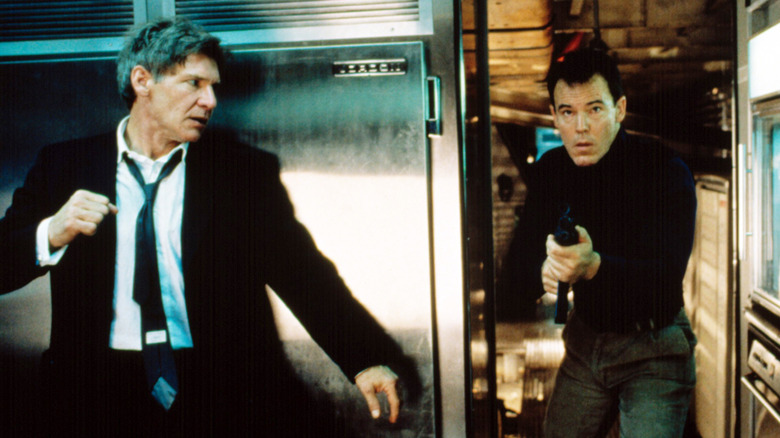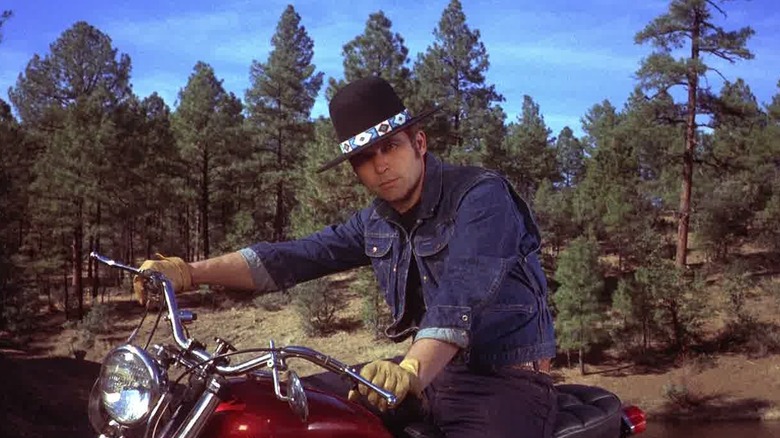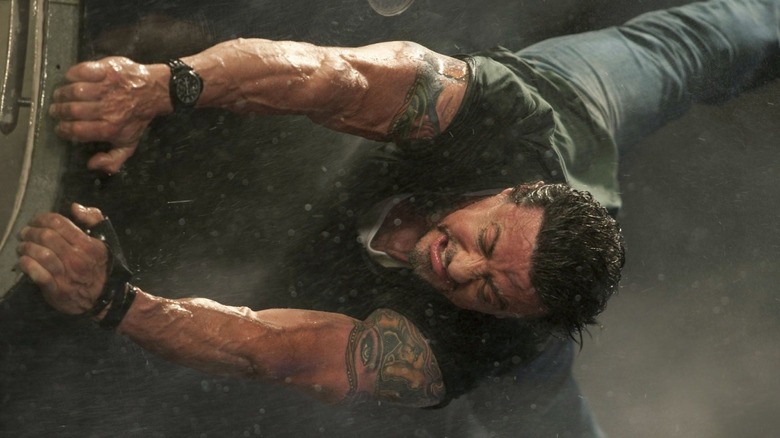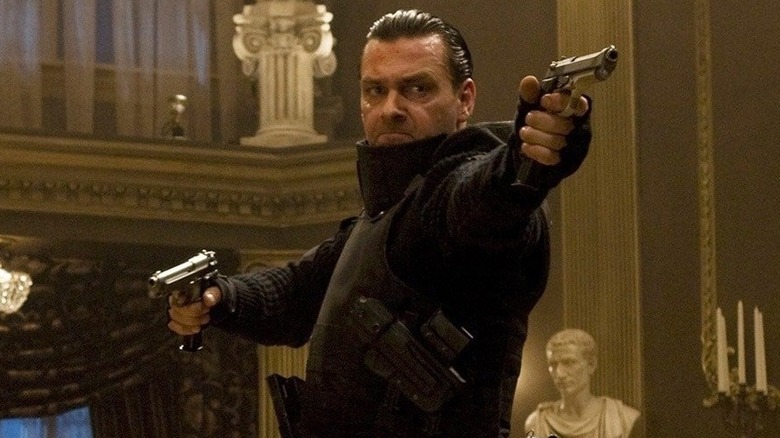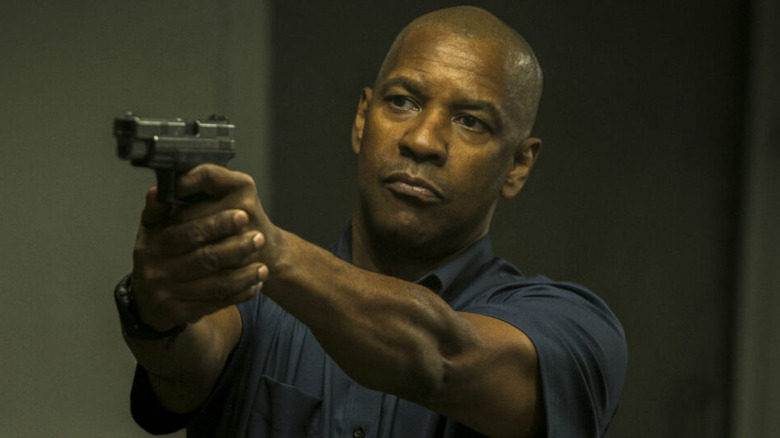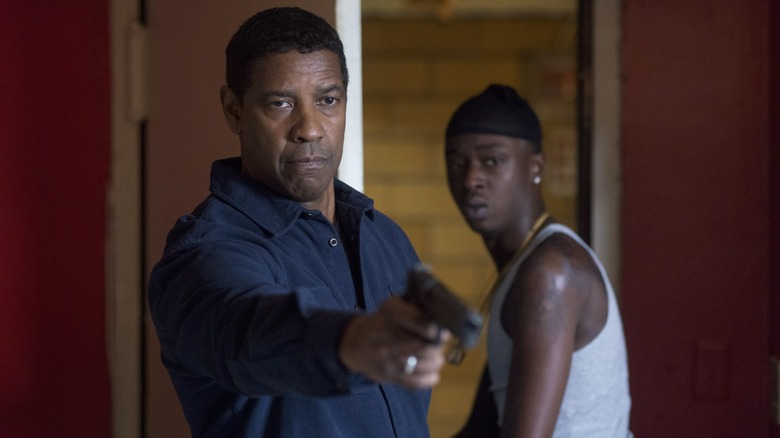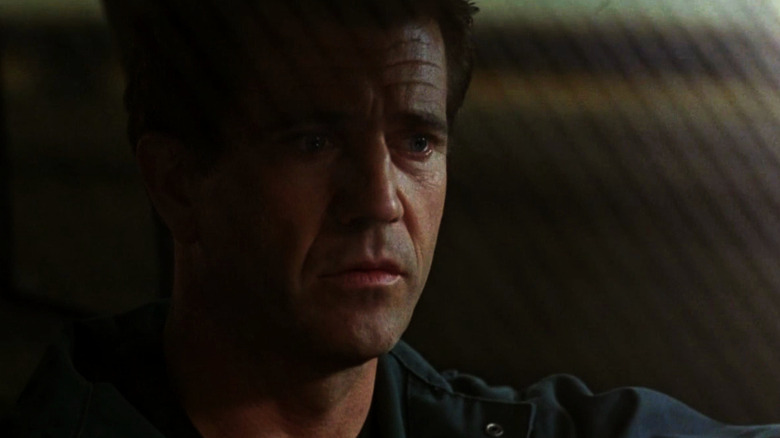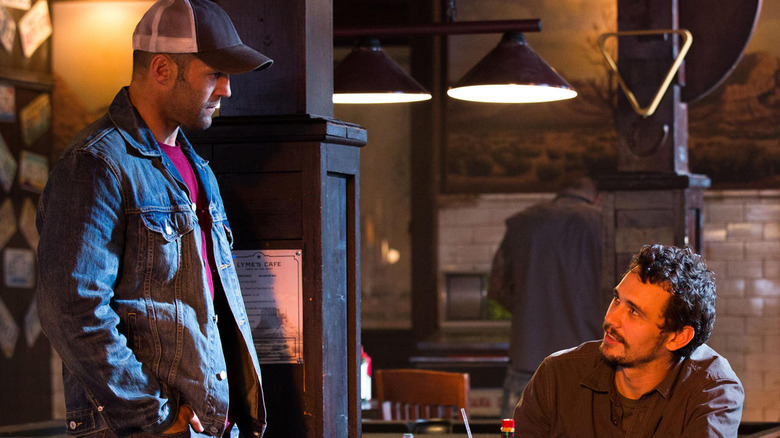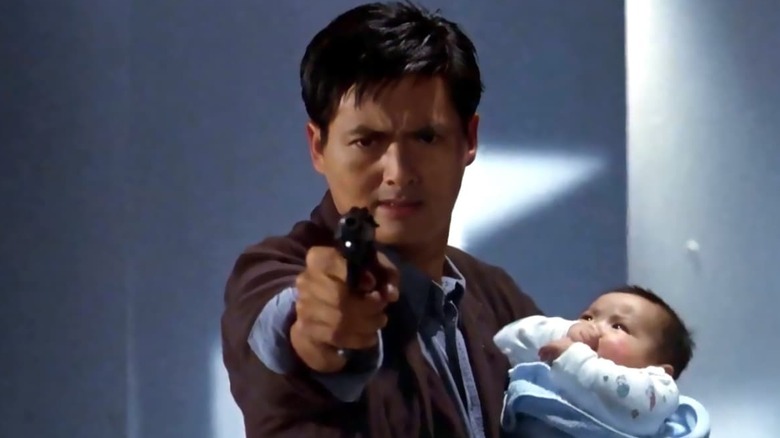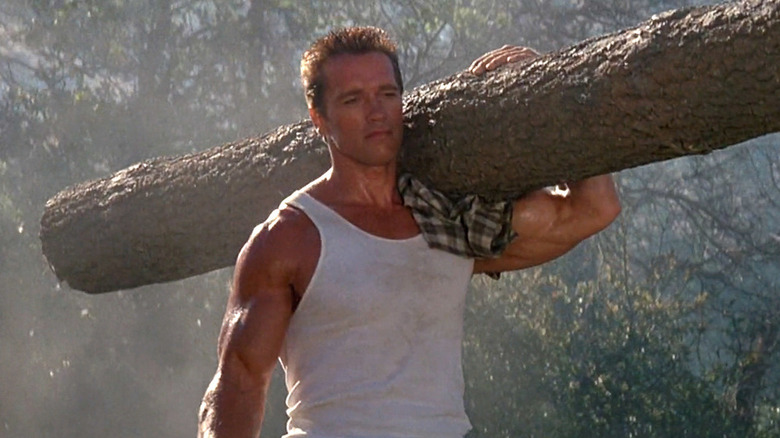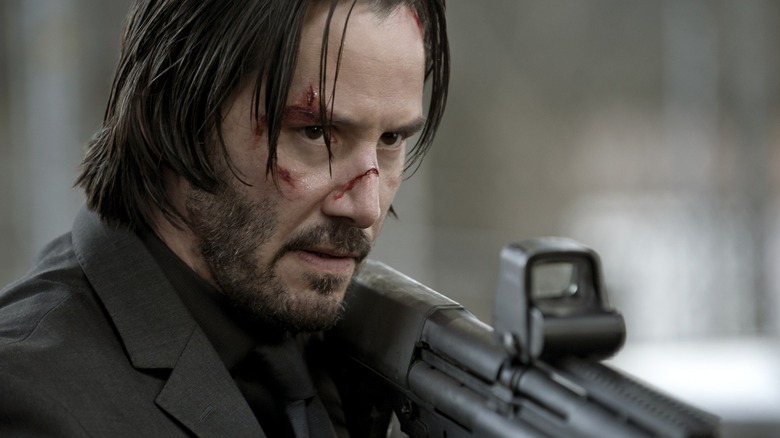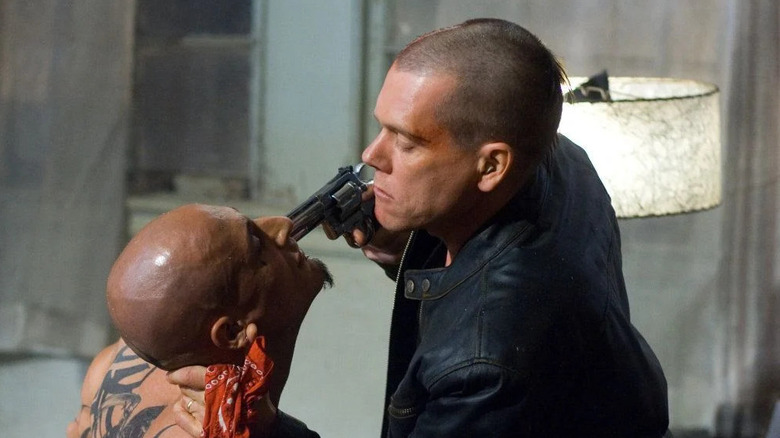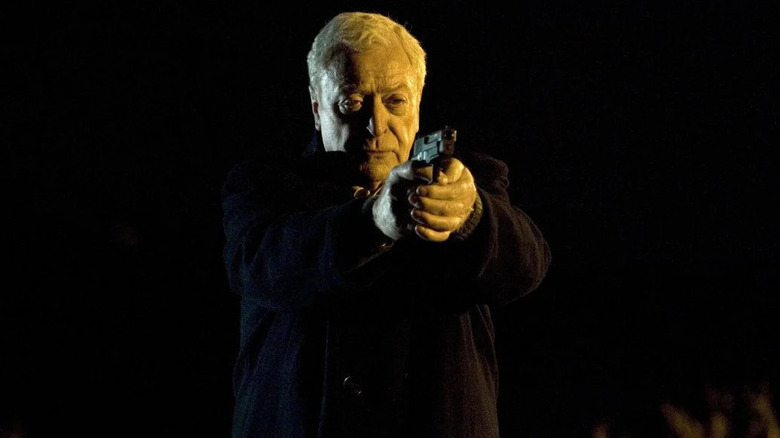20 Movies Like Taken That Are Worth Your Time
When "Taken" hit theaters in 2008, few believed it would make any sort of meaningful impact. In fact, as he recounted to GQ, Liam Neeson himself thought it was bound to be a straight-to-video release. But "Taken" wound up becoming a surprise blockbuster, grossing over $226 million at the worldwide box office, a staggering nine times its $25 million budget. The film spawned two financially successful sequels and a television adaptation, which aired for two seasons on NBC.
"Taken" succeeded for two reasons: It has excellent action sequences and a straightforward story that resonates with viewers. Neeson plays Bryan Mills, a 50-something security expert and former Green Beret whose daughter is kidnapped by human traffickers. He proceeds to utilize his "particular set of skills" on a one-man rescue mission to take down bad guys and save his daughter.
Fans of "Taken" have much to appreciate in Bryan Mills' adventures, which are tremendously rewatchable. But if you're itching for other action movies starring dogged heroes who fight for personal justice, here are some that might strike your fancy. These 20 movies are worth any "Taken" fan's time.
3 Days to Kill
The script for 2014's "3 Days to Kill" comes from Luc Besson, the action auteur who co-wrote "Taken" and directed some of the greatest action films of all time, including "The Professional" and "Nikita." This high-concept flick starring Kevin Costner clearly apes the "old guy shoots bad guys" formula "Taken" perfects, but that's not a bad thing by any means. Plus, it's helmed by McG, one of the best action directors in Hollywood. He gives the film a delightful energy that helps the viewer roll with some unlikely storytelling decisions.
Costner stars as a terminally ill CIA agent trying to spend more time with his family. When Vivi, a black ops assassin played by Amber Heard, offers him an experimental medicine in exchange for "one last job," he embarks on a life-or-death adventure, all while trying to earn the love of his oft-neglected children. Though what results is somewhat uneven — it is, somehow, an action film and a family story — there's a bizarre grace to this juggling act. Furthermore, the film's leading man proves his versatility by jumping across genres with the ease of a seasoned professional. Costner is the lynchpin that keeps the whole affair fun and fearless.
Peppermint
Pierre Morel, the director of "Taken," returned for this 2018 revenge thriller starring "Alias" star Jennifer Garner. "Peppermint" casts her as Riley, a middle-class woman whose husband and daughter are killed by a drug cartel. The corrupt justice system fails to hold their killers accountable, and even tries to throw Riley into a mental asylum. She escapes and spends the next five years honing her mind and body into a machine built for one goal: revenge.
With "Peppermint," Jennifer Garner proves she's a full-on movie star. While the movie itself is tonally inconsistent and features a few slow stretches, Garner absolutely lights up the screen whenever she's in frame. Her portrayal of grief is instantly relatable to anyone who has experienced significant loss, and her dedication to intense action sequences is admirable. Speaking of which, "Peppermint" fully earns its R rating, featuring numerous shootouts that don't skimp on blood. When Riley wields a shotgun, the close-range monster literally blows its targets apart. "Peppermint" makes a compelling case that in a fair and just world, Garner would be starring in an R-rated action film every year. Sadly, this is not the case — but at least "Peppermint" gives her a chance to show off her seriously toned arms.
The Fugitive
Unlike some of the other films on this list, Richard Kimble (Harrison Ford) of "The Fugitive" doesn't have any Special Forces combat skills. In fact, he's probably never fired a gun before in his life. But one thing's for sure: He didn't kill his wife, and he's going to clear his name, one way or another.
Based on the '60s television series of the same name, "The Fugitive" sees Harrison Ford go on the run from the law after being framed for his wife's murder. When it becomes clear that there's a mountain of false evidence assembled, he decides to take justice into his own hands by uncovering the conspiracy against him and catching the one-armed man who actually killed his wife. Tommy Lee Jones, who plays the U.S. Marshal assigned to hunt down Dr. Kimble, won an Oscar for his performance as the dogged lawman, who learns that following the law is not always the same as seeking justice.
"The Fugitive" was a huge success and even led to a spin-off, "U.S. Marshals," which saw Tommy Lee Jones reprise his role. This time, he chases down a fugitive played by Wesley Snipes.
Run All Night
Outside of the original "Taken," our money says 2015's "Run All Night" is the best film of Liam Neeson's "action hero" period. This New York City-set thriller casts Neeson as Jimmy Conlon, an old gangster working for his friend, Shawn Maguire (Ed Harris). Due to his violent line of work, Jimmy is feared and hated by his own son, Mike (Joel Kinnaman). When Shawn's son (Boyd Holbrook) drags Mike to a drug deal gone bad, he triggers a chain reaction that leads to Jimmy killing his best friend's son to protect his own. Soon enough, Shawn's entire gang declares war on Jimmy and Mike.
"Run All Night" adds a healthy dose of New York City noir to its action formula. Neeson shines as the jaded old screw-up who is reinvigorated by his desire to protect his son from the horrors of the world, even if he's starting 30 years too late. The chemistry between Neeson and Kinnaman is fantastic, as are the scenes between Neeson and Ed Harris as best friends who find themselves in a struggle to wipe each other off the face of the earth. Throw in Common's performance as Andrew Price, a ruthless hitman hired to take down Jimmy and his whole family, and you've got one of the best action movies of the last decade.
The Searchers
While films like "Rio Bravo" and "McLintock!" portray John Wayne as a charismatic hero and productions like "True Grit" show him off as a rough-around-the-edges old-timer, few performances compare to his haunting work in 1956's "The Searchers."
One of the first "revisionist Westerns," "The Searchers" deconstructs the genre's racism. John Wayne's character, Ethan, hates all Native Americans. When his brother and his family are killed by a Comanche raiding party who also abduct the man's two daughters, Ethan leads a posse to recover the missing girls. However, it quickly becomes clear that Ethan is content to kill every Native person he comes across, much to the horror of his sidekick (Jeffrey Hunter), who is of Native American descent.
"The Searchers" is widely regarded as one of the greatest movies ever made. With his bold storytelling decisions, director John Ford, a titan of the genre, subverted the archetypes popularized by his own movies. Ethan is a vile, hateful man, so blinded by his racist obsession that he is willing to kill his own niece if she has been "corrupted" by her captors. "The Searchers" is not always an easy watch, but it is essential viewing for any cinephile worth their salt and a fascinating contrast to the rescue-and-revenge story featured in "Taken."
Hardcore
Paul Schrader wrote and directed this controversial 1979 thriller about a father searching for his daughter in the big bad city's seedy underbelly. "Hardcore" stars the legendary George C. Scott as Jake Van Dorn, a Calvinist Christian whose daughter goes missing in California. He hires a private eye (Peter Boyle) to track her down, who turns up a pornographic video featuring the missing girl. Jake embarks on an odyssey through the late 1970s porn scene in an effort to get her back.
While not a straightforward action film (or even a particularly violent one, which is a rarity for Schrader), "Hardcore" does have the momentum of one. Jake pushes and shoves his way through dangerous locations of ill repute as he searches for his daughter — though he fears she wasn't kidnapped, and instead left home of her own free will. Like the best of Schrader's work, "Hardcore" is incredibly uncomfortable to watch. Scott's fantastic performance as an old-timey patriarch furthers this vision: He's a 1950s character trapped in the commercialized depravity of the 1970s underworld.
"Hardcore" isn't a perfect film — Scott's style can be too overwrought for some, and the screenplay occasionally falls into meandering melodrama. But it is essential to understand the rise of the pornography industry and the urban decay that rocked countless cities across America in the 1970s.
Uncommon Valor
Gene Hackman is going to get his son back. That's the premise of "Uncommon Valor," though the film is far from a conventional action flick. Hackman plays Jason Rhodes, a retired military man who served in the Korean War. His son, Frank, was declared missing in action during the Vietnam War. Unable to live with the uncertainty any longer, Rhodes assembles his son's former unit for one last mission: They're going to venture into Laos and free the American prisoners of war who were left behind after the war's end.
Today, there are roughly 1,500 Americans who remain unaccounted for in Southeast Asia. Rumors of secret POW camps, however unlikely, persisted for decades following the end of the Vietnam War, emblematic of the scars that still lingered on the American psyche. Two years after 1983's "Uncommon Valor," Hollywood explored the controversy yet again in "Rambo: First Blood Part II." Interestingly, "Uncommon Valor" is directed by Ted Kotcheff, who directed 1982's "First Blood," the first cinematic appearance of the John Rambo character.
Air Force One
"Air Force One" was marketed with this simple tagline: "Harrison Ford is the President of the United States." Fortunately for fans of high-octane action, "Air Force One" isn't about pushing papers in the Oval Office, but Russian terrorists hijacking the titular plane and taking President James Marshall's family hostage. Thanks to the efforts of Secret Service agents who sacrifice their lives to ensure the president's safety, Marshall's able to hide during the initial attack. Once the dust settles, he resolves to take back his plane, one dead neo-Soviet terrorist at a time. That's right: It's "Taken" on a plane.
One of the best action films of all time, "Air Force One" shows Harrison Ford at the top of his game. He's fully believable as an action hero, taking down bad guys in brutal one-on-one brawls and high-tension shootouts. He's also tested in ways he never anticipated: When the villain (Gary Oldman) starts killing innocent hostages, demanding Marshall surrender, the president must reconsider his vow to never negotiate with terrorists. "Air Force One" can be overwhelmingly harrowing at times, but it's all in service of pushing its hero to the brink of oblivion so that we can watch him triumphantly claw his way to victory — not just for himself, but for America.
Billy Jack
There are strong people in this world who oppress the weak, but the truly strong know it's their duty to protect the weak. Tom Laughlin writes, directs, and stars in 1971's "Billy Jack," which follows the titular half-Navajo Green Beret as he protects the students of the Freedom School, a hippie community of runaways and artistically-minded young people from underrepresented groups. The students are bullied by the bigoted residents of the local town, and the police are constantly trying to shut down the school. This inevitably leads to martial arts showdowns full of high-flying Hapkido moves, which were unprecedented in cinema of the era.
"Billy Jack" is an action movie about a man of peace. The titular character doesn't want to fight his way out of situations, but he knows that violence is the only language some people — especially bullies — understand. "Billy Jack" was actually the second film to feature the character, who is introduced in Laughlin's earlier film, "The Born Losers." After "Billy Jack" became a massive commercial success, Laughlin produced two more sequels, "The Trial of Billy Jack" and "Billy Jack Goes to Washington." While none of the other films can match the quality of "Billy Jack," they're still absolutely worth watching for fans of the character.
The Expendables
"The Expendables" sets out to accomplish something big: Assemble the greatest cast of action movie superstars the world has ever seen. It definitely succeeds. Sylvester Stallone plays Barney Ross, leader of a team of mercenaries. His crew includes Jason Statham, Jet Li, Dolph Lundgren, Terry Crews, Mickey Rourke, and Randy Couture. Arnold Schwarzenegger and Bruce Willis make brief cameo appearances, though their roles are expanded in the sequel.
While "The Expendables" could have easily been a brainless shoot-'em-up, Stallone imbues the script with enough character and melancholy to give audiences something real to chew on. Ross and his team decide, for once in their lives, to go into battle to save their souls, rather than make a buck. Of course, there's still a metric ton of delightfully gory R-rated action: Any fan of 1980s-style thrills will not be disappointed.
If possible, watch the Extended Director's Cut of "The Expendables," which contains many new scenes and alternate takes — it outclasses the theatrical cut at every turn. "The Expendables 2" is just as good as the original (some might say even better, particularly with regard to its more polished production values), but the less said about "The Expendables 3," the better.
Punisher: War Zone
The Punisher has always been one of Marvel Comics' most controversial characters, due to his Bryan Mills-ish qualities. Within a world populated by colorful superheroes, Frank Castle can't fly or shoot lasers from his eyes — but he knows how to use just about every gun under the sun, and he always aims to kill. Released in 2008, "Punisher: War Zone" stars Ray Stevenson as the armor-clad war hero whose family is killed by the mob. Ever since, he's waged a one-man war on New York City crime, leaving behind a trail of bodies from Far Rockaway to the Bronx. The film was a box office bomb, but has since developed a cult following thanks to its comics-inspired production values and outrageous levels of violence.
Watching Stevenson's Punisher cut through bad guys is mesmerizing. He's like a slasher movie monster, but he's also the hero of the story. As he literally tears his enemies to pieces with explosions, gunfire, and his bare hands, you might ask yourself, "He's supposed to be the good guy, right?" He is — and your shock at this fact is part of the film's appeal. "Punisher: War Zone" is like a prescription-strength dose of hardcore action cinema, distilled to its purest form.
The Equalizer
In 2014, Denzel Washington and his "Training Day" director Antoine Fuqua teamed up for "The Equalizer," a film loosely based on the 1980s television series starring Edward Woodward. Washington plays Robert McCall, a retired black ops specialist trying to live a quiet life in Boston. He befriends a teenage sex worker (Chloë Grace Moretz) enslaved by the Russian mafia, and offers to buy out her contract, so that she can be free. When they refuse, he decides to help her in another way: By dismantling the Russians' entire Boston operation with his own two hands.
During his violent quest, he discovers the peace and satisfaction that comes with civic duty. Like a certain character played by Liam Neeson, McCall has "a particular set of skills" that he uses to help Boston's local populace with their problems, be they corrupt cops shaking down local businesses or lowlife armed robbers. McCall is frequently seen reading Hemingway's "The Old Man and the Sea." The lesson, as he explains in one of the film's best scenes, is, "You've gotta be who you are in this world." McCall made his living as a CIA spy, but in his retirement, he uses those skills to help regular people even out the odds that are stacked against them.
The Equalizer 2
Four years after the first "Equalizer" film grossed a cool $192 million worldwide, Antoine Fuqua and Denzel Washington returned for 2018's "The Equalizer 2." This sequel finds McCall laying low in a quieter corner of Boston, helping his neighbors with their troubles in a generally non-violent way. Not always, though: He also takes on CIA-style missions for regular people, rescuing kidnapped relatives and the like.
McCall's work quickly becomes personal when a close friend is murdered, spurring him into war with an elite unit led by an old friend (Pedro Pascal). The story of "The Equalizer 2" is more sprawling, but also more intimate than that of the first film. Its climactic showdown sees McCall return to his old hometown while it is ravaged by a passing hurricane. As Fuqua told ScreenRant, "Man's hardest journey is the journey back home": The hurricane is a metaphor for the emotional stakes of McCall's journey.
"The Equalizer 2" proved just as successful as the first, grossing $190 million worldwide. A third "Equalizer" film is currently in development, which will presumably feature Denzel Washington beating up bad guys while taking his character on a new, introspective journey.
Ransom
1996's "Ransom" leans heavily on Mel Gibson's performance as Tom Mullen, a man pushed to the edge when kidnappers steal his son. After he refuses to play ball with the bad guys, the film escalates into a war between Mullen and the mastermind, a corrupt cop named Jimmy Shaker (Gary Sinise).
While the film has bursts of action and adrenaline, the high points of "Ransom" are the phone calls between Mullen and Shaker, who scream at each other with bone-chilling ferocity. Like any good father, Mullen is determined to not only get his son back, but to make the kidnappers regret ever thinking they could get away with hurting an innocent child. For his part, Shaker gets increasingly desperate and unhinged as he realizes this evil scheme has gotten him in way over his head.
While "Ransom" isn't held in the same esteem as the "Lethal Weapon" series or "Payback" (particularly its superior Director's Cut), it's still an exceptional thriller that leans more on acting than action. The result is well worth your time.
Homefront
Written by Sylvester Stallone, 2013's "Homefront" stars Jason Statham as a retired DEA agent who moves to a middle-of-nowhere Louisiana town with his young daughter. After the girl turns the tables on her bully and beats him up in a fair fight, the kids' two families are drawn into a rapidly escalating conflict. Naturally, this results in pulse-pounding action sequences.
While Statham might seem miscast as an all-American tough guy with an inexplicable accent, he does a good job. Plus, the rest of the film is loaded with ringers: James Franco, Kate Bosworth, Winona Ryder, Frank Grillo, and Clancy Brown are just some of the famous faces in "Homefront," and the child actors playing Statham's daughter and her bully do a fantastic job as well.
"Homefront" stands out thanks to its unique premise and focus on deeply flawed characters who put their pride first, at the expense of kindness and logic. The film is startling in its humanity, which is a testament to Stallone's talent as a writer and to the entire cast's winning performances.
Hard Boiled
No discussion of action cinema is complete without including John Woo, the man who revolutionized Hong Kong action with his depiction of slow-motion gun battles. Movies like "The Killer" and "A Better Tomorrow" showcase his penchant for balletic brutality, but not even those movies match the kinetic majesty featured in 1992's "Hard Boiled."
"Hard Boiled" stars Chow Yun-fat as Inspector Tequila, a jazz-loving policeman of the "shoot first, ask questions later" variety looking to take down a vicious criminal syndicate. The film's final act, which is set in a hospital, features one of the greatest shootouts of all time. The body count is ridiculously high, and scenes of villains gunning down patients and doctors may be off-putting to some viewers, but rest assured: The bad guys get what they deserve in the end.
The film's signature moment sees Tequila take down a bunch of armed goons with a gun in one hand and a baby in the other. Once Tequila realizes what he has to do, he tapes cotton balls to the baby's ears and then starts shooting. It's an unforgettable beginning to one of the most audacious and righteous gun battles in cinema history, and essential viewing for every action fan.
Commando
Arnold Schwarzenegger stars as John Matrix in 1985's "Commando," a tongue-in-cheek action extravaganza. The premise is basically that of "Taken": Matrix's daughter (Alyssa Milano) gets kidnapped, and Matrix is going to kill everybody until he gets her back. Rae Dawn Chong shows up as plucky comic relief, but that's pretty much the only additional wrinkle in a movie that deftly moves from one action sequence to the next. As you might guess, every single one of these jaw-dropping set pieces features Schwarzenegger killing bad guys in increasingly over-the-top ways while spouting intentionally dumb one-liners.
"Commando" is sometimes disparaged by critics who don't appreciate its comedic aspects. If you doubt their existence, consider this: John Matrix is introduced carrying a gigantic tree trunk over his shoulder. That image sets the tone for the rest of the movie, which doesn't seek to present anything else but 90 minutes of enjoyable violence and unsubtle homoeroticism. "Commando" is a classic within its genre, and the ultimate example of the deliciously dumb action flick.
John Wick
John Wick is a lonely man. After his wife dies of a terminal illness, he begins the healing process by befriending the puppy his wife had sent to him as one final gift. But when Russian gangsters break into his house to steal his prized 1969 Ford Mustang, they kill his innocent pet in the process. In retaliation, John Wick digs up his guns (literally — they're buried under his basement floor) and goes to war with the Russian mafia.
Sequels to this 2014 hit expand the story's universe, offering an especially in-depth look at the Continental Hotel, a safehouse for New York's assassination community. Though the worldbuilding of the "John Wick" franchise is certainly fascinating, the sequels lack the original's intimate charm. John's desire for revenge simply has the most personal stakes, much like the first "Taken" film. The sequels are certainly worth watching, though, with incredible action sequences and their own compelling storylines. Keanu Reeves is a killer action hero, and "John Wick" has quickly become his signature franchise.
Death Sentence
2007's "Death Sentence" was marketed with one of the best taglines in cinematic history: "Protect what's yours." Kevin Bacon plays Nick, a family man whose son is killed in a random gas station holdup. Stricken with grief and driven by revenge, Nick purposefully fails to name the murderer in court so he can kill him himself. This triggers a war between Nick and the killer's gang, led by Garrett Hedlund. As the film goes on, Nick undergoes a brutal transformation: He shaves his head and buys a bunch of guns to continue his revenge, at the expense of his own humanity and his dedication to his remaining family.
Essentially an updated version of the 1974 Charles Bronson vehicle "Death Wish," "Death Sentence" is ostensibly based on the sequel novel by Brian Garfield, but the story bears little resemblance to the original text. Still, the film is true to Garfield's themes, and the author praised the film, though he did take umbrage with the blood-soaked finale. This violence is tremendously powerful, courtesy of director James Wan ("Saw"), who makes every punch, knife slash, and gunshot resonate with viewers. "Taken" fans will appreciate the film's relentless pace and emotional stakes, and should, if possible, check out the unrated version: It restores deleted scenes and slightly extends the ending, leaving the film's final moment much less ambiguous.
Harry Brown
In 2009's "Harry Brown," Michael Caine plays the titular British widower, whose best friend is murdered by a gang of teenage delinquents. This isn't a warm and fuzzy movie where vicious teens are rehabilitated, though. With nothing left to lose in this world, Harry decides he's had enough: If the local authorities won't clean up the neighborhood, he will. One by one, he takes steps to protect himself and take down the gang.
Michael Caine was 76 when he starred in "Harry Brown," but his age only adds to the drama and excitement of the film. Like Bryan Mills, Brown has a past in the military: He was a Royal Marine in his younger days, and while he's decidedly out of practice, old soldiers never lose their killer instinct. "Harry Brown" is oppressively dark and gritty, but when the guns come out, it's exhilarating, thanks to Caine's surprising physicality and impressive acting. While the ending is a bit contrived, it's not enough to derail the film. People can debate the morality of vigilantism until the cows come home, but "Harry Brown" proves one thing: You're never too old to make a difference in your community.
